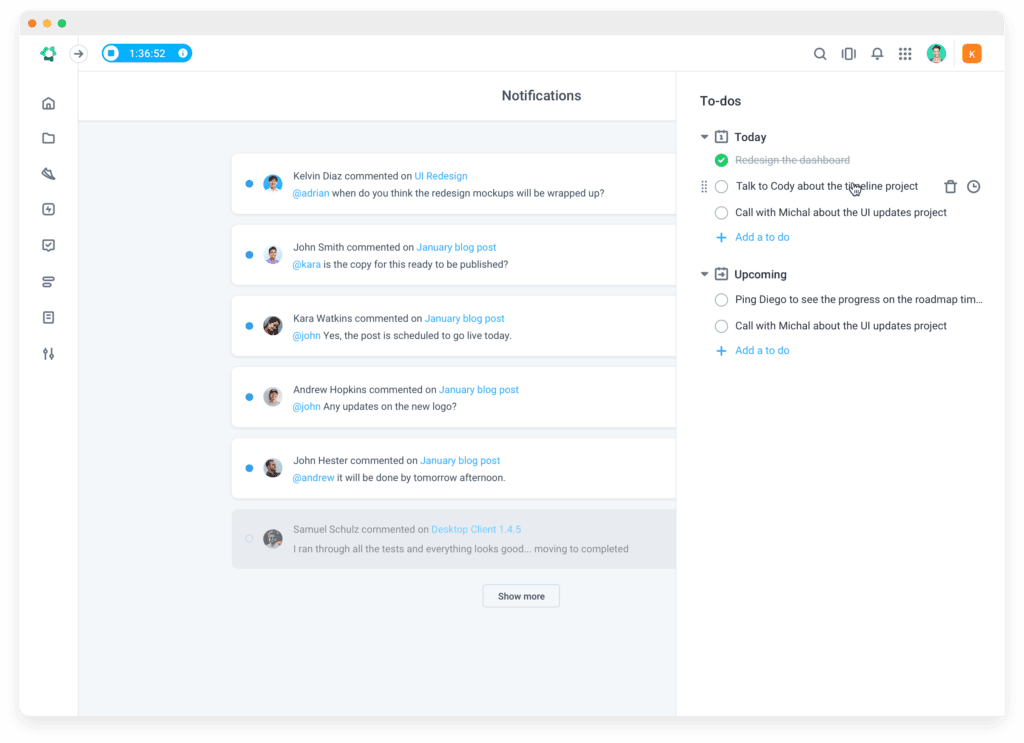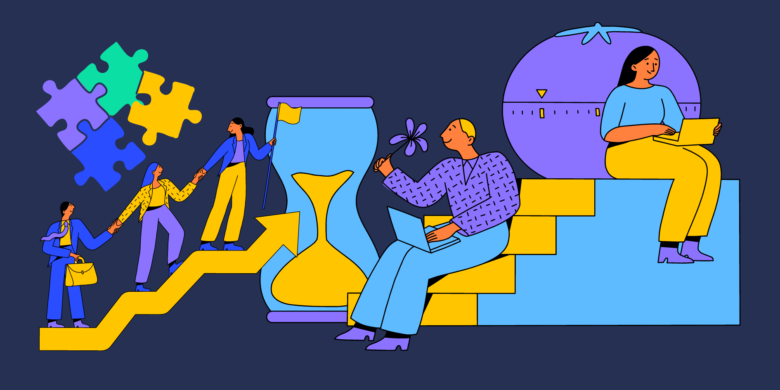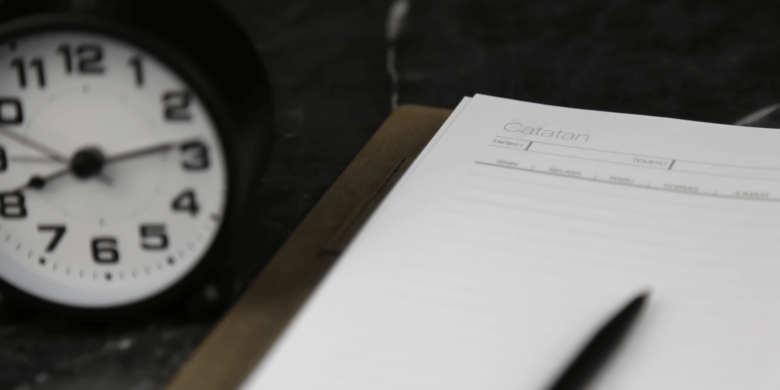Do you ever feel like there isn’t enough time in the day to get everything done? You’ve tried every productivity and time management trick in the book, but you’re still feeling pressed for time.
Does this sound familiar? You may be suffering from time anxiety.
In the United States, anxiety disorders are among the most common mental illnesses. They affect 18.1% of the population, or 40 million adults over 18.
It’s natural to feel anxious from time to time in our hyper-productive culture. However, there are ways to ease chronic worry about work.
In this article, we’ll answer the following questions to help you understand time anxiety:
- What is time anxiety?
- What are the three types of time anxiety?
- What are the symptoms of time anxiety?
- What are some ways to manage time anxiety?
Boost your team’s efficiency with Hubstaff's productivity tools
Try it free for 14 daysWhat is time anxiety?
Time anxiety, according to Healthline, is an “ongoing feeling of uneasiness and even dread around the passage of time.”
For example, you might feel anxious and fear that time is running out. Or you feel guilty about lost or wasted time. Time anxiety is caused by obsessing over whether you are spending your time productively.
So, what causes time anxiety? Here are a few ideas about what might be going on under the surface.
What are the three types of time anxiety?

Daily time or current time anxiety
This is the daily feeling of being rushed, overloaded, and stressed out. So, most of the time, you feel like there aren’t enough hours in the day.
Tomorrow time or future time anxiety
With tomorrow time anxiety, you’ll get anxious thoughts when you think about what might happen in the future.
You have anxious thoughts about whether you are doing enough for the long run. You could also be resentful of things you could have done but didn’t.
Existential time anxiety
It’s easy to feel like time passes too quickly or that we don’t have enough time for family, friends, or hobbies. When we think about how short our time on Earth is, it can sometimes give us existential time anxiety.
While these emotions can arise at any time, Healthline says certain events can set them off, such as:
- The feeling that we’re not making progress, as if life has come to a standstill
- Significant (and especially unexpected) life changes
- A large-scale emergency (this includes the pandemic)
- Negative thoughts or anxious thoughts
- The loss of a loved one
Dr. Alex Lickerman, the author of The Undefeated Mind: On the Science of Constructing an Indestructible Self, says that time anxiety comes from self-help questions like:
“Am I creating the greatest amount of value with my life that I can? When it comes my time to die, will I feel that I spent too much of my time frivolously?”
These are big questions, and it makes sense that they might weigh heavily on us.
What are the symptoms of time anxiety?
Now that you have a better understanding of time anxiety, let’s look at a few signs to figure out why you might be feeling stress or strain.
Worrying about being late
Alex Lickerman says time anxiety can lead to a preoccupation with being late in everyday life.
Lickerman also states that worrying about time can affect your mood and overall well-being. If you’re just a few minutes late, you might feel stressed, annoyed, or angry.
If you’re worried about being late, that can also keep you on edge all the time. Instead of thinking about work, you might spend a lot of your daily life looking at the clock or figuring out how to get where you’re going next.
Feeling rushed all the time
Do you have a high sense of urgency? If it’s overdone, it can turn into time anxiety and make you want to rush from one place to another, often for no reason.
Do you think about all the work you have to do? Afraid that you won’t be able to do it or that you won’t be able to do it well? Do you struggle to find free time? These things can all be signs of acute time anxiety.
You have anxious thoughts when things don’t go as planned
Your ambitions may be causing your time anxiety. Do vacations or personal time with loved ones trigger negative thoughts? You may feel anxious for every second you spend not working on your goals.
Spending time in much-needed relaxation can cause stress since you might feel unsatisfied using your time resting instead of working.
How do you manage time anxiety?
In reality, you may never be completely free from anxiety. That’s fine — it’s typical to have anxious thoughts.
To help you cope with everyday life, here are some strategies for dealing with time anxiety.

Accept your anxious thoughts and take a deep breath
According to Tanya J. Peterson, an educator and author on mental health, it is best to start by realizing when you’re stuck in this time trap and acknowledging your thoughts and feelings.
Here’s what else Tanya recommends:
“Breathe slowly, deeply, and mindfully. Slow, deep breathing deactivates your body’s stress reaction (the sympathetic nervous system and fight-flight-or-freeze) and activates the calm, rest-and-digest response of the sympathetic nervous system.
Mindful breathing means paying attention to the act of breathing. Either close your eyes or gaze at an object you find pleasing and pay attention to the sound and feel of the air entering and leaving your body. This step is very important for stopping your system’s reaction to stress and anxiety.”
Tanya concludes by saying that taking a few deep breaths will help you be more productive throughout the rest of the day.
Recognize when you have control over time and when you don’t
Before you panic about time, consider these facts.
- Time exists.
- You can’t slow or speed up time.
- You can shape the future. However, you cannot change the past.
Even if it’s obvious, you should remember these essential points. Since you can’t change the past, it’s helpful to try not to worry about it. Time travel is still impossible. Focus on the future, which you can control.
If you are running late to a meeting, breathe. Instead of criticizing yourself for not leaving earlier, ask yourself, “does it matter?” Trying to disrupt anxiety symptoms can help you calm down before you get so frustrated that you can’t even join the meeting when you arrive.
It’s not that you are purposely attempting to be late — or that you don’t care about other people’s time or feelings, according to psychotherapist Somia Zaman who specializes in cognitive behavioral therapy.
Some people are natural-born optimists who believe they can handle everything in their hectic schedules. In fact, according to Zaman, these people are “over schedulers” and frequently load too much into a single day.
When you plan your deadlines, be flexible. Whatever time you assign to a task, try doubling your estimation. Recognize that unexpected jobs may emerge as you schedule your work.
Subscribe to the Hubstaff blog for more posts like this
Set priorities for the time you can influence
What are ways to spend your time that are enjoyable to you and get you into a good flow? Be conscious and aware of your schedule and how you spend your time.
Also, if you’re worried that you don’t spend enough time on important things, you should think about what “time well spent” means. Most people want to feel like they’re living their best life, and spending time on things and people that matter can help with that.
Talk to a mental health professional
Anxiety disorders include generalized anxiety disorder, panic disorder, social anxiety disorder, and phobia-related disorders.
If you already have an anxiety disorder, dealing with time anxiety on your own can be difficult. Professional help can help you take the first steps toward dealing with these worries.
Suppose time anxiety affects your mood and keeps you from social situations and doing things you enjoy. In that case, a mental health professional can help you figure out why and develop strategies or interventions.
Improve your time management skills
If you have many things you would like to accomplish, start by listing them out. Create a hierarchy of what you would like to accomplish, and understand “the why.” Also, ask yourself why you are trying to accomplish these things?
Next, make room in your life for the tasks that contribute to what you would like to achieve. Always spend enough time on what matters to you — tracking time can help you identify areas of improvement.
As you track your time, be sure to add comments and write down the times you feel anxious so that you can learn to manage those situations better. Describe what you were doing and how you felt when you had an anxiety attack.
Your notes will help you identify anxiety symptoms, helping you make sense of what’s stressing you out.
Get rid of things that waste your time
An ancient Greek philosopher, Theophrastus, once said that “time is the most valuable thing a person can spend.”
How much time do you spend scrolling through TikTok or Instagram videos? Mindless flipping through social media wastes time and contributes to time anxiety.
You’re not alone if you’ve lost time to screens. Every day, global internet users spend an average of 144 minutes on social media platforms.
Productivity apps can help you identify the unproductive time in your day. Hubstaff keeps track of activity, projects, and tasks as you keep track of your time.
Practice mindfulness
Mindfulness, or the ability to stay in the present moment, is essential for your mental health. Pay attention to what you’re doing right now instead of worrying about what will happen in the future.
Being in the moment is a great way to slow down without doing less. You can access so much more information when you are fully present in the moment.
Develop strategies to control time anxiety
Time, unlike other aspects of our lives, is uncontrollable. What you can control is how you spend your time. Accept the things you can’t change and focus on the things you can.
Do you ever wonder where the day has gone? Keep track of your time and learn how to cut down on time spent on activities that don’t further your goals or make you happy.
- Spend time on things that are important to you.
- Concentrate on what you’re doing right now.
- Make a strategy to assist you in achieving all of your objectives.
- Create better habits and eliminate time-wasting distractions.
- Learn how to estimate projects effectively.
- Focus on the most important things to feel accomplished at the end of the day.
- Begin with tasks that make you happy and allow you to enter a flow state.
Most popular
How to Calculate a Raise: Practical Guide for Employers
By 2030, the US alone will lose $430 billion annually due to low talent retention — and a lot of this turnover stems from low pa...
How to Survive and Thrive in an 80-Hour Work Week
It’s hard to believe that only a century ago, the 80-hour work week was the norm in the United States. Then, in 1926, the Ford M...
Mastering Workforce Scheduling: Techniques and Tools for Success
Imagine a workday where scheduling your workforce effectively ensures that every shift is perfectly aligned with your business nee...
Top Time Trackers for Virtual Assistants: Enhance Efficiency and Accountability
Virtual assistants (VAs) have a lot of responsibilities — and so do the people who hire them. With so much to keep track of, a t...






